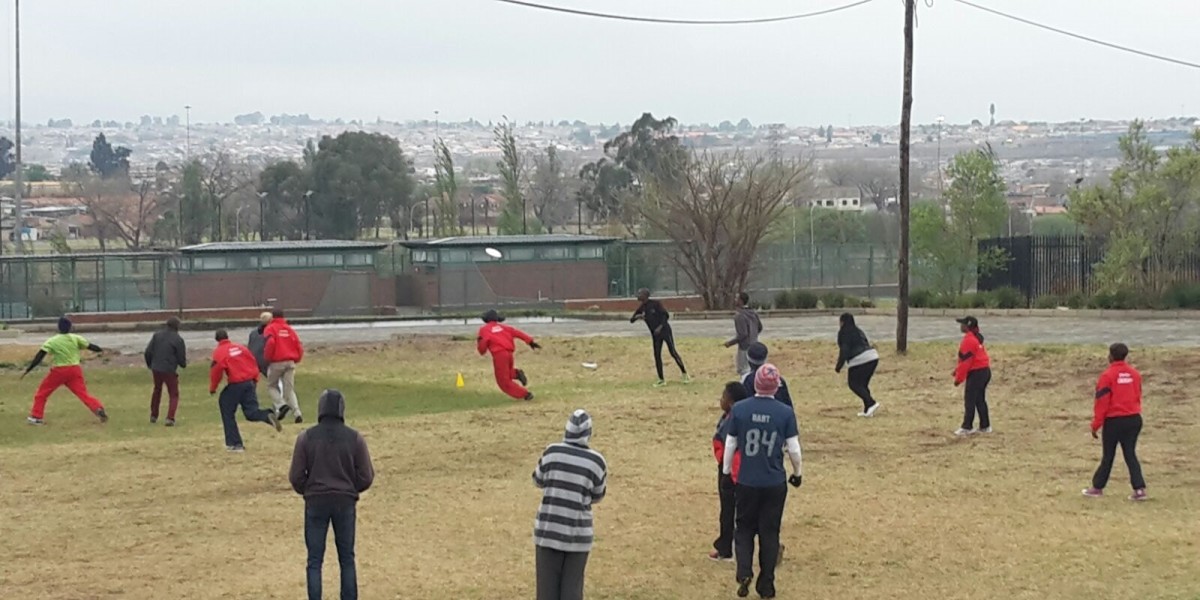
Johannesburg is a vibrant city located in the heart of South Africa. It was established after the discovery of gold in 1886. The name of Soweto is actually an abbreviation for the name South Western Township which was the original name for the city. I say city because the population of Soweto itself was 1.2 million people when the last census in 2011 took place. Soweto was originally established to house the many African people that were removed from white areas under the Apartheid system but this city has triumphed over the adversity to which it owes its establishment. Today Soweto is a vibrant, bustling area. Those who were once forced to move here now choose to stay because they love the sense of community which is not found in more developed urban areas.
The daily struggles are evident to any visitor. In the morning, the streets are filled with young children in school uniforms walking to school. The roads are crammed full of minibus taxis (these are like mini vans but each one is packed with at least 15 people) on the way to work. It is not uncommon for these taxis to simply stop in the middle of the road to allow passengers on and off.
My drive in to Soweto is a dizzying affair as I try to avoid potholes, crazy taxis, and scores of pedestrians. I count at least 6 mothers fetching water in 5 litre buckets. There are so many empty fast food containers lining the sides of the road that it is not impossible to understand why Soweto has one of the fastest growing obesity rates in the world.
Stopped at a traffic light, I see a group of what must have been 10 or 11 year old boys passing around a full on, man-sized cigar.
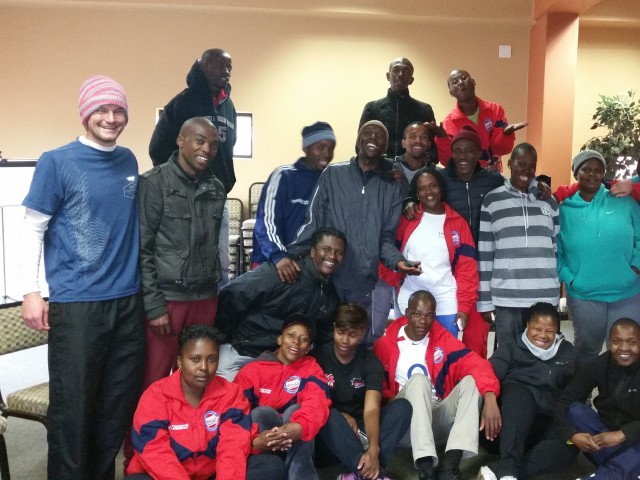
As an ultimate player I have a healthy love for a patch of green grass to play on. The Soweto locals consider grass to be a real pain, so they actively kill it. Most homes are devoid of lawns. On one street, I counted only 3 out of 18 houses had a small patch growing outside.
Training is at the Jabavu Public Library. I asked Paul why we were there and he explained that only the government buildings and public sports facilities that had any space to play on. This library is located in one of the built up areas of Soweto called Pimville. I passed a school on the way there and did not see a single blade of grass on the playing field. It was all sand. Two soccer fields with goalposts, on each field must have been about 30 boys surrounding each goal, fighting over a soccer ball. I stopped on the side of the road to watch (mainly because there was a minibus taxi in front of me blocking traffic) and I noticed something funny about the ball. It was made out of rolled up plastic bags that were tied together with elastics. This is how we make soccer balls in Africa, which is actually preferred to a real soccer ball, because they cannot get punctured from the stones on the field.
When we arrived at the Library, I saw a small pitch of about 80 yards by 80 yards. The grass was just hanging on and there were stones all over the pitch. As I set out cones for our session and I throw as many stones as I can off the pitch. Even so, I still don’t think it was a safe pitch to layout on.
The Gauteng Flying Disc Association (GFDA) engaged in an outreach project to spread the game of ultimate to the community of Soweto this year. It all started with another organisation called Move-It Moving Matters. Their aim is to use the Physical Education class time during school days to help grow young South African learners into valued and contributing citizens of the Republic.
Move-It Moving Matters has recruited and trained 20 young, unemployed people from the local community and given them training in sports coaching. These interns then go into local schools and conduct the Physical Education program developed by Move-It Moving Matters.
The aim was to introduce the interns to the game of ultimate because they were teaching a game to the school children called Flip-it, this is a version of ultimate which teaches the techniques and rules for young children to learn how to play is taught by the Move-It Moving Matters interns.
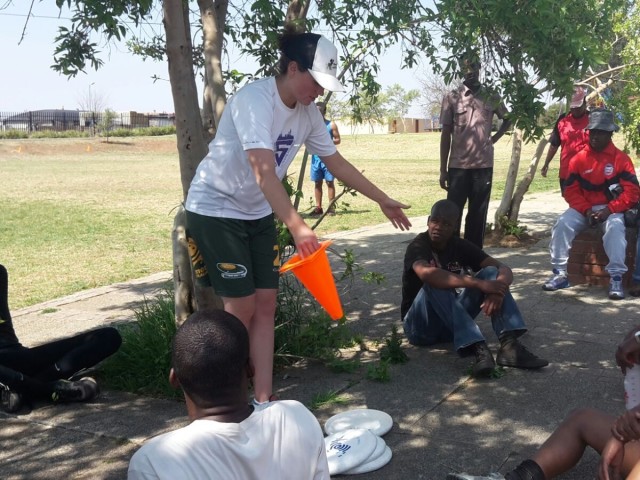
5 of us crowded into a small room in the library. Paul, the coordinator of the program from Move-It Moving Matters, assured me that everyone would be there soon because some of them had to walk further than others. We began going through the World Flying Disk Federation rules. As we progressed from section to section the interns slowly trickled in. By the time we covered section 16 the room was full. 24 people crammed into a conference room in the library to introduce the game of ultimate to Soweto.
We warmed up with those courageous few who braved the chilly morning. After a run around, the interns split into groups and started throwing. The simple act of throwing flat backhand passes to each other and catching them quickly brought smiles to cold faces. Those who lingered in the library, choosing to stay warm, soon raced out to join us.
When we moved on to forehand passes the magic happened. As Charlotte (Jordaan – GFDA Outreach Committee Member ) and I went from group to group showing the proper grip and technique for a forehand I could see a passion start to grow in enquiring eyes. As we watched the first successful forehand throw I felt warmth. With a simple flick of their wrist every intern caught a little bit of the ultimate bug. The wobbly, floaty forehand throws were converting spectators to players right before our eyes.
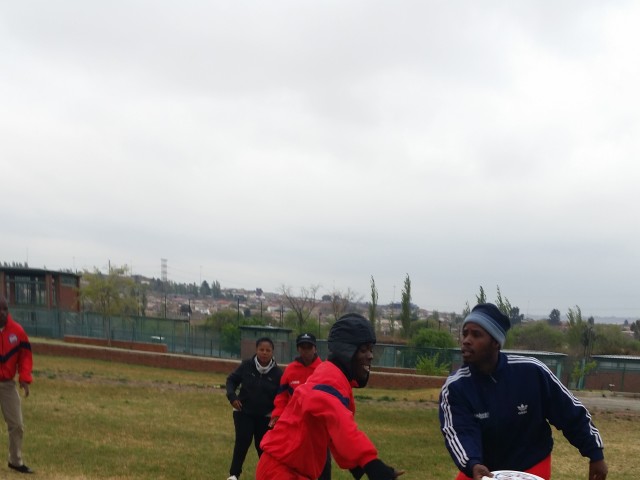
That subtle moment when the interns progressed from throwing a Frisbee to ultimate players was happening. I had the opportunity to witness 20 people absolutely lose themselves in the joy of the simple act of throwing a disc.
We moved on to a game of 7 v 7, on a field restricted by size requirements. The morning wind was sliced by some very interesting and innovative throws. All of the interns have sporting experience and coaching experience in other areas, and their athleticism was undeniable.
What caught me totally by surprise was the enthusiasm and laughter.
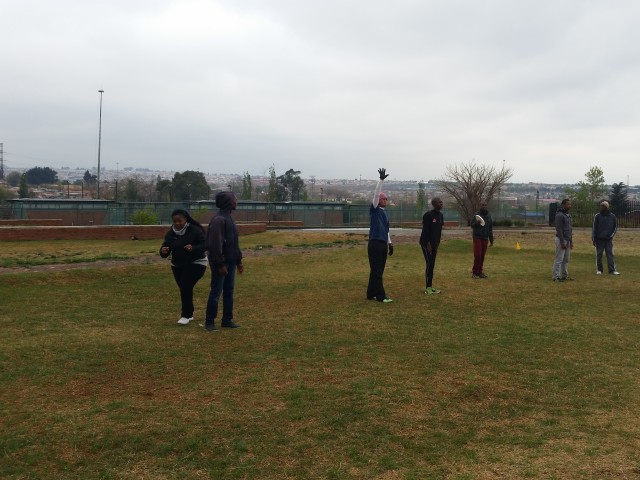
The shrieks of joy and cries of achievement were infectious. One special moment stands out. One of the interns threw a forehand pass down the left wing, it sailed up and carried for about 20 metres. Another intern ran in under it and totally misread the disc. He missed it and it slipped to the ground. Everyone went crazy! The interns all ran to the thrower and jumped around shouting, “Forehand pass, yoh! So far! Forehand!” The pure joy of throwing a sweet pass is something most of us have forgotten. To be so happy with something we all take for granted made me stop and think for a while.
As the practise went on and the interns learned about how to stack and what the force is, they were getting more and more excited. I could not stop myself from smiling, and it stayed with me for the rest of the day. I want to play like that. Every time I pick up a disc in future I will remember how that simple piece of plastic can change lives. I will never walk onto a field again without taking a moment to think about how blessed I am to be a part of this world wide family. Not everyone gets a chance to throw a disc with abandon. I am so grateful for the opportunity to spread the disc love a little.
Happiness shared is happiness doubled, so let’s spread the love and grow ultimate in South Africa. Get an outreach portfolio going in your ultimate club and go spread the love. I promise it will come right back to you twice as much!
As part of our outreach program we will be starting a “donate-a-disc” campaign. If anyone has old or spare used discs that they would like to donate to a good cause we will be collecting discs for the Soweto Ultimate Frisbee team. To donate a disc please get hold of the Gauteng Flying Disc Association at gfdacommittee@googlegroups.com or the author at jehart1015@gmail.com and we will arrange for your disc to find us.







Comments Policy: At Skyd, we value all legitimate contributions to the discussion of ultimate. However, please ensure your input is respectful. Hateful, slanderous, or disrespectful comments will be deleted. For grammatical, factual, and typographic errors, instead of leaving a comment, please e-mail our editors directly at editors [at] skydmagazine.com.